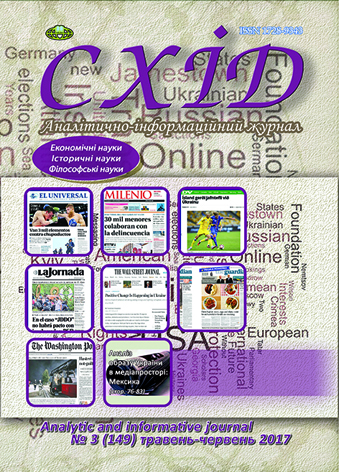Modern view on the gender issues in the religious context in terms of historical retrospective
DOI:
https://doi.org/10.21847/1728-9343.2017.3(149).105228Keywords:
gender, gender socialization, gender stereotypes, patriarchal, religious factor, sexAbstract
This article examines the notion of "gender", its social and cultural significance and its development in historical retrospective. The emphasis is laid upon the influence of the religious factor on the formation of the notion of gender. The author pays attention to the multiaspectual nature of the concept of "gender" and the variability of accentuations in its interpretations by different researchers. Moreover, the article illustrates the role of feminism in drawing attention of the scientific community of humanitaristics to the gender issues. The author highlights the existence of biased gender stereotypes in modern society and offers a possible way of gender discrimination problem solution. The present state of affairs clearly demonstrates the existence of gender stereotypes that are reflected in all spheres of life. The problem of gender differentiation and gender socialization is becoming more and more important for both ordinary citizens and scientific community, which indicates their growing relevance. The article is dedicated to the history of the concept of "gender", the influence of various factors on the development of this concept and the differentiation of its key aspects in the interpretations of different researchers. Moreover, the article describes the significant contribution of the feminist tradition of the 60s to drawing attention to the problems of the gender system taken as a whole. The author focuses on the analysis of gender issues in the philosophical and religious studies, emphasizing the importance of the religious factor in the formation of ideas about gender and noting that this issue remains insufficiently studied. A successful attempt is made to show the influence of culture, in particular of such its component as religion, on formation of behavior patterns for men and women to follow. The author believes that gender differentiation is rather caused by social and cultural factors than by the psychophysiological features, because the process of gender identification develops in accordance with accepted social norms. Furthermore, the author points out the overrepresentation of gender stereotypes, that are rather biased, and the necessity for creating the best possible social and cultural conditions for the personal fulfillment of both sexes.
Downloads
References
Aristotle (2000). Polityka [translat.], Osnovy, Kyiv, 239 p. (ukr).
Bem, S. (2004), Lenses of gender: Transformation of views on the problem of gender inequality [translat.]: «The Russian Political Encyclopedia» (ROSSPEN), Moscow, 336 p. (rus).
Beauvoir S. de (1994), Second sex [translat.], 2 tons. Volume 1, Osnovy, Kyiv, 390 p. (ukr).
Voronina O. (2001), Traditional philosophical, sociological and psychological theories of sex, Theory and methodology of gender studies, MCGS - MSSHSEN - MFF, Moscow, p. 39. (rus).
Martsenyuk, Tamara [ed.] (2017), Gender for all. Challenge to stereotypes Osnovy, Kyiv, 256 p. (ukr).
Chukhym N. (2006), A woman’s vision in Western philosophical tradition (from antiquity to modern), Kyiv Institute of Gender Studies, Kyiv, 123 p. (ukr).
Hark, Sabine & Kerner, Ina (2007), Der neue Spartenfeminismus, in: Feministische Studien. Zeitschrift für interdisziplinare Frauen- und Geschlechterforschung. 25. Jg., Heft 1, 2007, S. 92-95 DOI: 10.1515/fs-2007-0109.
Heller, Birgit (2003), Gender und Religion, in: Figl, Johann (Hg.): Handbuch Religionswissenschaft, Innsbruck, S. 758-769 (germ).
Sammet, Kornelia (2010), Die Bedeutung des Geschlechts im evangelischen Pfarramt. In: GENDER, Zeitschrift für Geschlecht, Kultur und Gesellschaft, S. 81-99 (germ).
Lanwerd, Susanne (2004), Gender in der Religionswissenschaft, in: Gender Studies. Wissenschaftstheorien und Gesellschaftskritik, Würzburg, S. 189-199 (germ).
Lanwerd, Susanne (2004), Maria, jungfrauliche Mönche und die bildende Kunst. Piegeler, Hildegard (u.a. Hg.): Gelebte Religionen. Festschrift für Hartmut Zinser. Würzburg, S. 315-324 (germ).
Shwed, Z. (2016), The methology of geteronormativity research in religious studies, Hungarian scientific journal, Vol. 1, №1. (1), рр. 81-86 (eng).
Slee, N. (2017), Review of Gina Messina-Dysert & Rosemary Radford Ruether (eds.), Feminism and Religion in the 21st Century: Technology, Dialogue, and Expanding Borders, New York & Abingdon: Routledge Taylor & Francis, 2015, viii + 218 p. DOI: 10.18352/rg.10192
Van Die, M. (2014), Review of Tine Van Osselaer, Patrick Pasture (eds.) Christian Homes. Religion, Family and Domesticity in the 19th and 20th Centuries, Leuven; Leuven University Press, 227 p. DOI: 10.18352/rg.10193.
Downloads
Published
How to Cite
Issue
Section
License
Copyright (c) 2017 Iryna Starovoit

This work is licensed under a Creative Commons Attribution-NonCommercial-NoDerivatives 4.0 International License.
1. Authors bear responsibility for the accuracy of facts, quotations, numbers and names used.
2. Manuscripts are not sent back.
3. The publisher does not always agree with the authors' opinion.
4. The authors reserve the right to authorship of the work and pass the first publication right of this work to the journal under the terms of a Creative Commons Attribution-NonCommercial-NoDerivatives 4.0 International License. This license allows others to distribute (copy) the published work for non-commercial purposes, provided there is mandatory attribution to its authors and a link to the first publication in our journal.
5. The authors have the right to conclude separate supplement agreements that relate to non-exclusive work distribution in the form in which it has been published by the journal (for example, to upload the work to the online storage of the journal or publish it as part of a monograph), provided that the reference to the first publication of the work in this journal is included.

